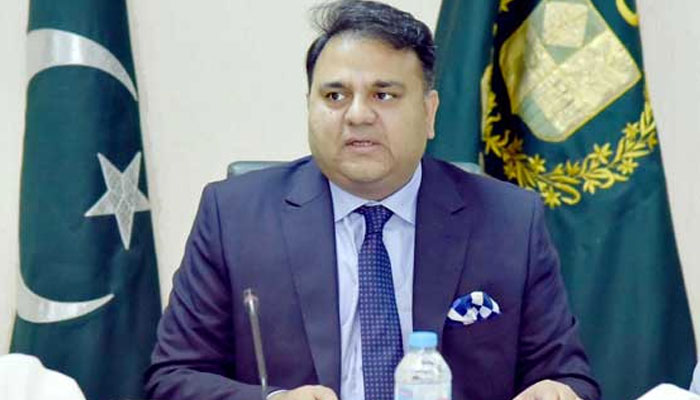Army chief extension: Supreme Court verdict has legal flaws, says Fawad Chaudhry
In fact, the SC verdict had totally ignored Article 243 while announcing its verdict in the said case. He said the apex court could not instruct the parliament to legislate or vice versa, or decide the appointment duration of any official.
ISLAMABAD: Federal Minister for Science and Technology Fawad Chaudhry has said the Supreme Court decision on extension of Army Chief General Qamar Javed Bajwa has legal flaws.
In an interview, he said that the federal cabinet was awaiting detailed verdict of the apex court after which a review petition could be filed in the court. He said there was little room for raising a question about the legal competence of Justice Asif Saeed Khosa, Justice Mian Mazhar Alam Khan Miankhel and Justice Syed Mansoor Ali Shah, but he believed there were various flaws and lacunae in their verdict in army chief’s extension case.
In fact, the SC verdict had totally ignored Article 243 while announcing its verdict in the said case. He said the apex court could not instruct the parliament to legislate or vice versa, or decide the appointment duration of any official. He said parliament is an independent body, and it was not under the Supreme Court.
The federal minister said the army chief’s duration period was given in the constitutions of 1956 and 1962. However, in the 1973 Constitution, the parliament abolished the article about time duration of the Chief of Army Staff after thorough deliberations. He said the parliament which gave the 1973 Constitution wanted full authority for the prime minister to appoint or remove any army chief. If armychief’s time duration would be given in the Constitution, how he would be removed from his post if the prime minister wanted so.
To a question if the government would file a review petition against the SC verdict, he said he believed it should be filed once the detailed verdict was pronounced. He said various options in that regard had been discussed in the cabinet meeting. He said it was high time Treasury, Opposition, Army and Judiciary sit together and decide their ambit; otherwise, a tussle among the state institutions for authority would continue in future.
The minister said the judiciary holds all parliamentarians accountable under articles 62-63 of the Constitution, but was not ready to appear before the Public Accounts Committee of the Parliament for its accountability. The Army also did not want to undergo any accountability process, and the media too did not want any restrictions. But in all that process, the most important institution of the country, Parliament, was losing its importance. He said the country could not move forward if Parliament was not made a sovereign institution.
Fawad Chaudhry said the government was not interested in keeping Nawaz Sharif or Asif Ali Zardari in jail but recovering the looted money from them and returning it to the country.
-
 Critics Get Honest About 'A Knight Of The Seven Kingdoms'
Critics Get Honest About 'A Knight Of The Seven Kingdoms' -
 Why Harry Unlikely To Meet William, Kate During UK Return?
Why Harry Unlikely To Meet William, Kate During UK Return? -
 X To Change AI Chatbot 'Grok' After Outrage Over Explicit Deepfake Images
X To Change AI Chatbot 'Grok' After Outrage Over Explicit Deepfake Images -
 Princess Eugenie Set To Hit New Milestone As Andrew's Eviction Looms
Princess Eugenie Set To Hit New Milestone As Andrew's Eviction Looms -
 Emilia Clarke Gets Honest About Featuring In Shows Like 'Game Of Thrones'
Emilia Clarke Gets Honest About Featuring In Shows Like 'Game Of Thrones' -
 Amazon Employees’ Break-time Fight Ends In Murder In Texas
Amazon Employees’ Break-time Fight Ends In Murder In Texas -
 Peter Jackson Reveals A Viggo Mortensen Mishap In 'LOTR' Fans Totally Missed
Peter Jackson Reveals A Viggo Mortensen Mishap In 'LOTR' Fans Totally Missed -
 Marsh Farm: Work Underway On Andrew Mountbatten-Windsor's New Home
Marsh Farm: Work Underway On Andrew Mountbatten-Windsor's New Home -
 'Rip' Director Dishes On Matt Damon, Ben Affleck's ‘brotherly’ Dynamic
'Rip' Director Dishes On Matt Damon, Ben Affleck's ‘brotherly’ Dynamic -
 Meghan Markle Handed Strict Warning: ‘You’re Playing With Fire In A High Risk, High Noise’ Game’
Meghan Markle Handed Strict Warning: ‘You’re Playing With Fire In A High Risk, High Noise’ Game’ -
 Paul McCartney Reveals How Close He Came To Giving Up Music
Paul McCartney Reveals How Close He Came To Giving Up Music -
 Kate Middleton’s Secret Message Decoded: ‘She’s Done With All This!’
Kate Middleton’s Secret Message Decoded: ‘She’s Done With All This!’ -
 Police Uncover Secret Cannabis Empire Ran By New York Woman
Police Uncover Secret Cannabis Empire Ran By New York Woman -
 'Euphoria' Season Three Trailer Shows Chaotic Life After High School
'Euphoria' Season Three Trailer Shows Chaotic Life After High School -
 Marisa Abela Opens Up About Impact Of Cancer Treatment On Lifestyle
Marisa Abela Opens Up About Impact Of Cancer Treatment On Lifestyle -
 Kensington Palace Shares Video Of Windsor Castle Ceremony
Kensington Palace Shares Video Of Windsor Castle Ceremony




